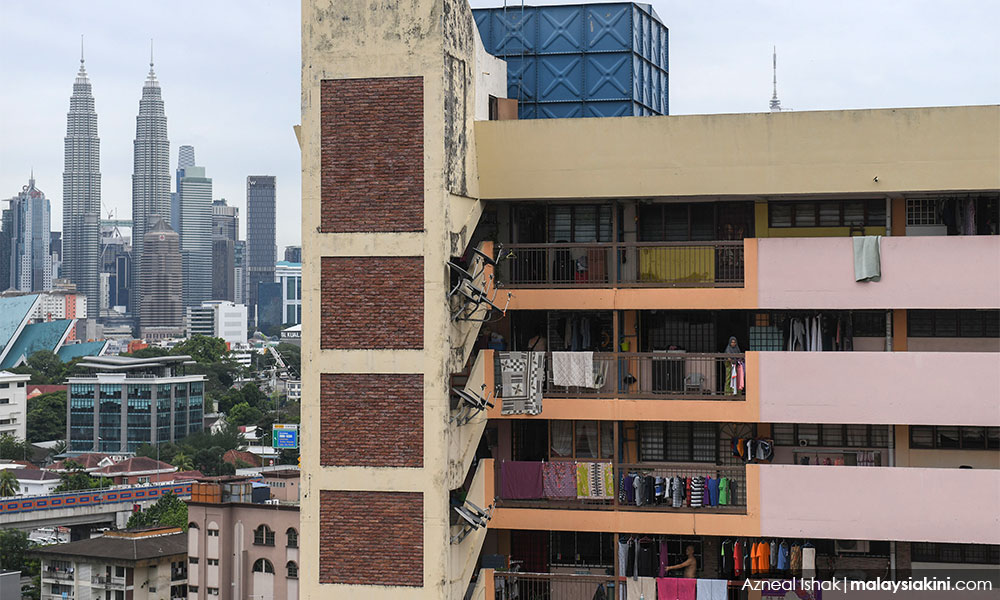When Prime Minister Ismail Sabri Yaakob makes a slew of statements on affordable housing, it is a sign that the elections are not far away.
When the prime minister announces a plan to build 5,000 council houses for the urban poor and vows to make Kuala Lumpur City “inclusive”, and that he would pursue a development that leaves “nobody behind”, you can conclude that the election pledges are being made.
When the prime minister says that he has instructed Bank Negara Malaysia to review the housing financing model to facilitate house ownership, you can confirm that the election juggernaut has started rolling.
But will banks be willing to lend if they know the borrower may not be able to repay the monthly instalments towards the loan?
The prime minister in a parliamentary reply in September last year said that over half a million middle-income group (M40) households have slipped into the bottom 40 percent (B40) category due to the current health and economic crises caused by the Covid-19 pandemic.
At prevailing market prices, and to put the issue in the right perspective, are houses really affordable and can the prime minister keep his promises?
The price-to-income ratio or “median-multiple” was developed in 1988 by the United Nations Centre for Human Settlement (UNCHS) and the World Bank to quantify affordable housing.
Surveys found that the “global norm” for affordability is three times the annual household income.
Based on the “median multiple”, a house is considered affordable if it can be financed by less than three times a household’s annual income. In other words, the price to income ratio should not exceed three.
This means that if you earn RM5,000 a month, you can only afford an RM180,000 house. So, where does one find houses in Kuala Lumpur at these prices?
The prime minister has set up a 25-man committee on affordable housing - but what can anything be done if the cost of land is high, especially in the Klang Valley?
Where is the prime minister going to get the land to build 5,000 houses in Kuala Lumpur as promised, or in the other states?

Land is a state matter and states, including the Kuala Lumpur City Hall (DBKL), are more than happy to fill their coffers by selling land to private developers or entering into joint-venture agreements with developers.
Documents and evidence produced in recent court cases indicate that land belonging to the state had been alienated to certain companies for lucrative sums of money.
Money has become a great mover
Talking about affordable houses, the late Zakaria Deros would be a good case study.
When he was a state assemblyperson for Port Klang, he owned two low-cost houses in Kampung Idaman, Pandamaran.
Thereafter, the state alienated a piece of land earmarked for low-cost housing to his wife, on which Zakaria built a 16-room “palace”.
Herein lies the problem: Are states going to support the government’s plans or are they going to ignore their contributions by making available suitable land that can go into the national land bank?
When land is alienated to cronies and political parties, shouldn’t land be allocated for public housing?
In the past, I have written about large parcels of land surrendered by housing developers for religious purposes and public amenities ending up in the hands of well-connected individuals.
Even land surrendered for a cemetery was sold to developers for commercial purposes. These parcels were subsequently developed, making millions for the owners.
Some states are allowing large tracts of agricultural land to be converted into commercial land, without any form of contribution or allocation of land for low-cost or affordable housing.

The approving authority, the state executive committee sees the ringgit sign and how it would enrich the state instead of their social responsibility to the residents.
In the past, states had imposed conditions that any development after the land has been converted should set aside and develop low-cost houses.
But these conditions are no longer applicable and implemented because money has become a great mover. But then again, are low-cost houses allocated based on merit or whom-you-know?
Many years ago, doing a series of investigative reports, I discovered that up to 500 low-cost houses were owned by staff of the Petaling Jaya City Council or their relatives or nominees.
It is on record that a number of staff were allocated low-cost houses as a “reward” for their “contribution” in the “zero squatters” campaign, which unfortunately did not meet its target.
They included a director and an engineer. Besides, I discovered that some of those who owned low-cost houses lived in affluent areas in the city.
I had previously campaigned on “owner-occupied” low-cost flats and “owner-operated” hawker stalls. This will put an end to the rent-seekers, middle persons and cronies who exploit the vulnerable by re-renting their flats and even pajak (lease) their licences to third parties.
With so much demand and the government being unable to provide housing for the poor, wouldn’t it be prudent to “forfeit” low-cost units which are being rented out?
It is not in the least suggested that they be “seized” - but shouldn’t they be “acquired” by returning the monies these people paid?
Affordable housing will remain a dream or an election promise unless all the parties – the federal, state and local governments - work in unison and not in silos.
While the federal government screams on the need for affordable housing, the states seem to be interested only in the money that comes while local governments are issuing development orders without ensuring developers as corporate citizens contribute to public housing and not just look at profits. - Mkini
R NADESWARAN is a veteran journalist and writes on bread-and-butter issues. Comments: citizen.nades22@gmail.com
The views expressed here are those of the author/contributor and do not necessarily represent the views of MMKtT.




No comments:
Post a Comment
Note: Only a member of this blog may post a comment.